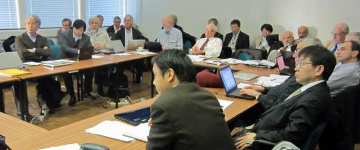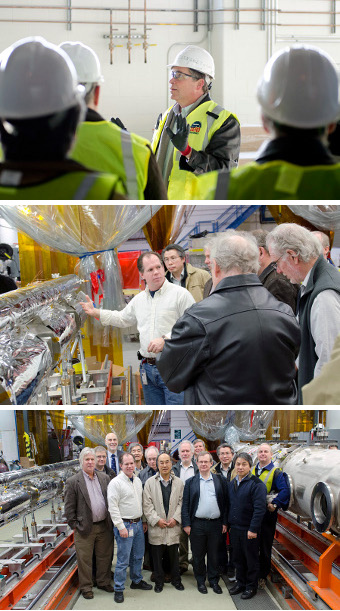Image of the week
|
|
Images: Jefferson Lab
Charles Reece, deputy director of Jefferson Lab’s Institute for Superconducting Radiofrequency Science and Technology, leads GDE Executive Committee members on a tour of the new facilities that will be available upon completion of the Technology and Engineering Development Facility, a $72 million structure that will keep the lab in the forefront of SRF developments.
John Hogan, Jefferson Lab SRF Cryomodule Production Leader, shows GDE Executive Committee members the sixth C100 cryomodule (of ten) being produced at Jefferson Lab as part of the lab's 12 GeV CEBAF Upgrade Project. This cryomodule is at the cold-mass assembly stage and Hogan is discussing the integrated design of the components as they relate to overall cryomodule performance.
Members of the GDE Executive Committee pause during a tour of Jefferson Lab's Institute for Superconducting Radiofrequency Science and Technology for a group photo between two C100 cryomodules being built for Jefferson Lab's 12 GeV Upgrade.
|
In the News
-
from Le Monde
23 February 2012
“Dès lors que les expériences peuvent reprendre, en quelques jours, les physiciens auront la réponse définitive sur les effets liés à ces branchements et à l’horloge de synchronisation”, indique Stavros Katsanevas. Si les neutrinos “ralentissent” et se remettent alors dans le rang de la physique, il restera à Opera le titre de “meilleure mesure de la vitesse des neutrinos”. Pas si mal. Mais loin du Nobel.
-
from Science
22 February 2012
It appears that the faster-than-light neutrino results, announced last September by the OPERA collaboration in Italy, was due to a mistake after all. A bad connection between a GPS unit and a computer may be to blame.
-
from CERN
20 February 2012
A new kind of conference will be launched next week in Geneva, uniting physics, biology and medicine for better healthcare.
-
from InterAction Collaboration
15 February 2012
In the second session focused on particle physics at the AAAS Annual Meeting, the leaders of Japanese, American, European and Canadian particle physics laboratories will discuss how particle physicists surmount cross-border and cross-cultural challenges to achieve their scientific goals. They will also look ahead to the new form of global partnership that will be needed to build the world’s next big particle physics facility.
-
from China Daily
15 February 2012
In his decades-long research career, Xie has made outstanding breakthroughs in accelerator physics, accelerator technology and free electron lasers.
Copyright © 2026 ILC International Development Team




